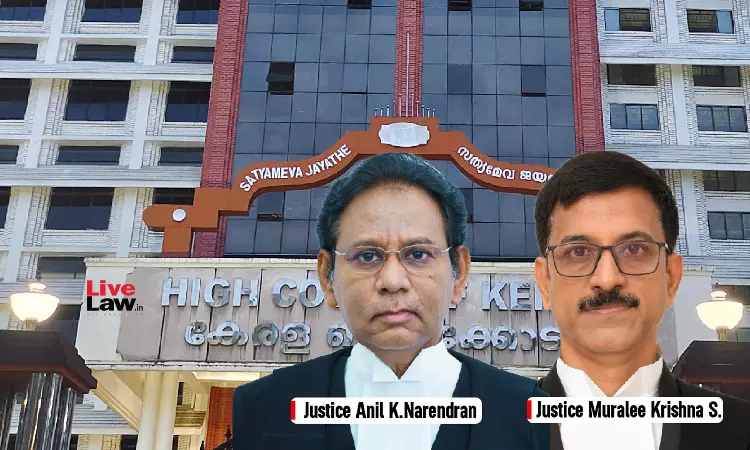- Home
- /
- High Courts
- /
- Kerala High Court
- /
- Constitutional Remedy Cannot Be...
Constitutional Remedy Cannot Be Invoked By Litigant To Avoid Approaching Tribunal Under SARFAESI Act: Kerala High Court
Anamika MJ
28 Oct 2025 7:25 PM IST
The Kerala High Court has observed that a litigant cannot use the constitutional remedy of writ petitions as an alternative to avoid approaching the Tribunal under the SARFAESI Act, which would require the payment of fees.A Division Bench of the Kerala High Court comprising Justice Anil K. Narendran and Justice Muralee Krishna S was considering a writ petition challenging proceedings initiated...
The Kerala High Court has observed that a litigant cannot use the constitutional remedy of writ petitions as an alternative to avoid approaching the Tribunal under the SARFAESI Act, which would require the payment of fees.
A Division Bench of the Kerala High Court comprising Justice Anil K. Narendran and Justice Muralee Krishna S was considering a writ petition challenging proceedings initiated by Hero Fincorp Ltd., a private Non-Banking Financial Company (NBFC) under the Securitisation and Reconstruction of Financial Assets and Enforcement of Security Interest Act, 2002 (SARFAESI Act).
The appellants approached the High Court seeking to quash a possession notice issued under Section 13(4) of the SARFAESI Act and to permit repayment in instalments. A Single Judge of the Court had earlier dismissed their petition, citing lack of bona fides and the availability of an alternative statutory remedy before the Debt Recovery Tribunal (DRT).
The appellants then filed the writ appeal, contending that the SARFAESI proceedings were illegal since the overdue amount was less than 20% of the principal and interest, invoking Section 31(j) of the Act.
Relying on the decision of Supreme Court in South Indian Bank Ltd. v Naveen Mathew Philip [(2023) 17 SCC 311], the High Court reiterated that a writ of certiorari is to be issued over a decision when the court finds that the process does not conform to law or the statute.
“Courts are not expected to substitute themselves with the decision-making authority while finding fault with the process along with the reasons assigned. Such a writ is not expected to be issued to remedy all violations.” the bench observed.
It further observed that when a statute prescribes a particular mode for adjudication, the writ Court must not encourage attempts to circumvent that mode. It noted that, when a tribunal is constituted, it is expected to go into the issues of fact and law, including the statutory violation.
“The object and reasons behind the SARFAESI Act are very clear as observed in Mardia Chemicals Ltd. v. Union of India [(2004) 4 SCC 311].While it facilitates a faster and smoother mode of recovery sans any interference from the court, it does provide a fair mechanism in the form of the Tribunal being manned by a legally trained mind. The Tribunal is clothed with a wide range of powers to set aside an illegal order, and thereafter, grant consequential reliefs, including repossession and payment of compensation and costs. Section 17(1) of the SARFAESI Act gives an expansive meaning to the expression 'any person', who could approach the Tribunal. ” it further observed.
The Court also examined whether a writ petition under Article 226 of the Constitution was maintainable against a private NBFC invoking powers under SARFAESI Act and whether such proceedings were barred under Section 31(j), when the default amount is less than 20% of the loan amount and interest.
Relying on the decision by Supreme Court in Shobha S v Muthoot Finance Ltd. [2025 (2) KHC 229], the court held that the appellants cannot invoke the writ jurisdiction under Article 226 of the Constitution of India challenging the proceedings initiated under the provisions of the SARFAESI Act, which is a private NBFC.
While examining whether the proceedings were barred when the amount is less than 20% of the loan amount and interest, the Court relied on Biju Mathew Abraham v State Bank of Travancore [(2021) SCC OnLine 2585], and observed that the words in Section 31 (j) means the total amount due after discharging the liability up to 80%.
“There is no ambiguity to the words used in the statute to have a different interpretation. If this interpretation is not given to clause (j) of Section 31 of the SARFAESI Act, Sections 13(1) and (2) and other measures will become meaningless” the court noted.
The Court thus dismissed the writ appeal.
Case Title: M/S Thiruvonam Industries and Others v Hero Fincorp Ltd
Case No: WA 1708/ 2025
Citation: 2025 LiveLaw (Ker) 688
Counsel for Appellants/ Petitioners: E N Vishnu Namboodiri, P Shankaran Nampoothiri, Narayanan P Potty, M K Saseendran
Click Here To Read/ Download Judgment



